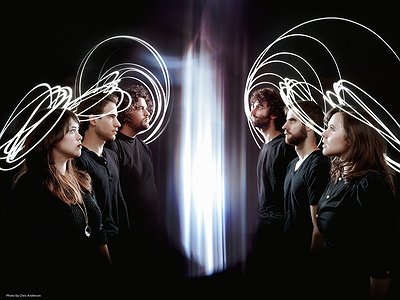Part 1
Name: Vince Welch for Bent Knee
Nationality: American
Occupation: Genre-defying Rock Band
Current Release: Land Animal on Inside Out Music
Recommendations: I would recommend the film Samsara, one of the most incredible and poignant combinations of visuals and sound that I’ve ever seen. And if you’re ever in Houston, I would highly recommend a trip to the Rothko Chapel. It’s one of the most powerful places I’ve ever visited.
Contact/Website: If you enjoyed this interview with Vince Welsh of Bent Knee and wish to find out more about the band, visit their website and Facebook profile for further information and current tour dates.
When did you start writing/producing music - and what or who were your early passions and influences? What what is about music and/or sound that drew you to it?
I started writing original music around the age of 16. My earliest influences included a lot of classic rock (Led Zeppelin, Hendrix etc.), as well as a lot of nerdy shred stuff (Joe Satriani, Steve Vai, Dream Theater etc.).
From the beginning, writing was always inexorably tied up in the process of recording. Writing new music and recording new music was one in the same for me. And I think what drew me to that was just the basic human urge to create. I simply got a huge kick out of sitting down and creating something out of nothing.
For most artists, originality is first preceded by a phase of learning and, often, emulating others. What was this like for you? How would you describe your own development as an artist and the transition towards your own voice? What is the the relationship between copying, learning and your own creativity?
Oddly enough I’ve noticed the opposite trend in myself. In both learning to write music, and in learning the art of recording it, I’ve been the most creative in the early stages. I believe there are two reasons behind this. First, in the beginning I have only a flimsy and somewhat ill informed view of what the “rules” are. So this encourages some unconventionality, as I fail to realize that some of the things I’m doing aren’t “normal.”
Secondly, when you start out you’re aware of what you want to do, because you can hear it in other recordings, but you lack the knowledge of how this was actually done. So you use your imagination and come up with some pretty ingenious and unorthodox ways of approximating what others who are more experienced than you are doing.
So at least for myself, there has been a challenge as I gain technical proficiency, to hold on to that sort of raw creativity that comes from beginner’s mind.
What were your main compositional- and production-challenges in the beginning and how have they changed over time?
This relates a lot to my previous answer. In the beginning you’re struggling to learn the craft, the actual nuts-and-bolts of how to do the thing. But you’re blessed with a lack of knowledge of what you’re “supposed” to do.
As you study and gain experience the craft part naturally comes, but with it comes an almost arrogance, where you think you know all the answers, and you loose that freewheeling creativity. This obstacle can be surmounted but I believe it requires constant effort and attention.
What was your first studio like? How and for what reasons has your set-up evolved over the years and what are currently some of the most important pieces of gear for you?
My first studio was a little four track tape recorder and a microphone or two. It would mostly be used in my bedroom, or occasionally in a friend’s garage.
Now, like almost everyone else, I use a computer. My personal setup is fairly minimal, featuring an in the box Pro Tools rig, a cheap audio interface and Focal speakers and Sennheiser HD800 headphones for monitoring. My only microphone is a Microtech Gefell MT71S. When I need more than this, which is quite often during the tracking stage, I go to a recording studio.
I’m quite a big fan of the HD800s. Unless you can spend a small fortune on speakers and room treatment, a more accurate window into recorded music is difficult to come by.
How do you make use of technology? In terms of the feedback mechanism between technology and creativity, what do humans excel at, what do machines excel at?
It goes without saying that anytime you make a recording, you are utilizing technology. So technology is very important to my artistic aims, as the artistic medium that I primarily work in (recorded music) wouldn’t even exist without this very recent technological development.
It’s a little difficult to say what it is that humans excel at and what machines excel at. I don’t really view the two as equal partners in the artistic process. Machines are just tools that humans create, occasionally in the service of art. We like to think that we’re in control of our creations, but often it seems more like the opposite is true.
Production tools, from instruments to complex software environments, contribute to the compositional process. How does this manifest itself in your work? Can you describe the co-authorship between yourself and your tools?
In Bent Knee, music is always written with the knowledge that this music will be recorded. That means that we’re able to, both consciously and unconsciously, plan the music so that it will work on recording. So in this way the technology is already playing a big role, right at the genesis of the music.
But in the less abstract sense, all of us except the drummer Gavin are using electrical instruments. So again technology is right there playing a role at the songs’ beginnings. In the case of Chris and I, we’re both using laptops, so basically we’re doing something that would have been more or less impossible to do 20 years ago.
Collaborations can take on many forms. What role do they play in your approach and what are your preferred ways of engaging with other creatives through, for example, file sharing, jamming or just talking about ideas?
Given the democratic nature of Bent Knee’s writing process, learning to collaborate effectively has been crucial. Really, it’s been largely about learning how to communicate. Any collaboration is essentially a negotiation. You and the other(s) will agree about some things, disagree about others, but at the end of the day you need to find your way to something that everyone involved is proud to call their own.






